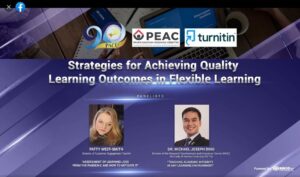On 24 September 2020, Our Lady of Fatima University (OLFU) President, Dr. Caroline Marian S. Enriquez took part as a speaker in a webinar entitled “The State of Higher Education in the Philippines” with Instructure’s Senior Director of Marketing – Asia Pacific, Edward Bray. The event was also hosted by Instructure, the home of world-renown Canvas Learning Management System.
The topic of the online discussion was the results of the June 2020 global study “State of Student Success and Engagement in Higher Education” conducted by Instructure and Hanover Research. According to the full report, the research aimed to “understand how higher education students and administrators define student success and how that varies around the globe.” Perceptions on the impact of COVID-19 were also included in the scope.
Focusing on the key trends and findings in the Philippines, Bray and Dr. Enriquez conversed about how the results fare with the actual situation of education in the country.
One of the trends found is that “work and career readiness are extremely important.” Dr. Enriquez agreed with this, saying that education is highly valued in the country. It is seen as a “step forward” from one’s “current status in life”; through education, people may be able to find good careers.
The results also showed that “socioeconomic disparities impact engagement”, with students from the lower socio-economic status “more than 4.1x as likely to report difficulty in staying very engaged in online/remote learning.” Dr. Enriquez mentioned related challenges, such as the economic status of parents, which may be struck by job retrenchments; this affected the number of students that dropped out, with reference to a different survey. Meanwhile, for those who can return to school, internet connectivity is one of the barriers. To add, Bray cited “availability of technology in the household,” referring to limited gadgets and computers within families.
Another trend revealed is that “online learning should be intentionally designed,” with the key dimensions being: (1) “Use of educational technology resources”; (2) “Hands on instruction”; and (3) “Personalised instruction.” “I think that the key here is really thinking that the online environment is different from the physical environment,” Bray said. Dr. Enriquez acknowledged such results as “real issues that must be addressed.” Referring to a survey conducted by the Philippine Association of Colleges and Universities on the readiness of schools for online delivery, she shared that many institutions were able to adapt to the digital shift, albeit done quickly in a short period of time. Because of this, she said the design of instruction can still improve overtime. In addition, access to technology and internet connectivity were also cited as issues.
Bray and Dr. Enriquez also talked about the impact of COVID-19 on student engagement, with 77% of the respondents reporting difficulty in staying engaged in online/remote learning. “It is important to find ways by which you could engage the students and make sure that you’re always in touch with them so that you can help them towards attainment of their success in each subject,” the OLFU President averred.
“It might be too early to make predictions, but I think there’s a good future for online education to happen. It’s just that we really have to be very creative on how to make sure that we could assess our students correctly and deliver our lectures as well as we can as educators,” said Dr. Enriquez.
Recommendations were likewise discussed, as well as other insights via a short question and answer portion.



